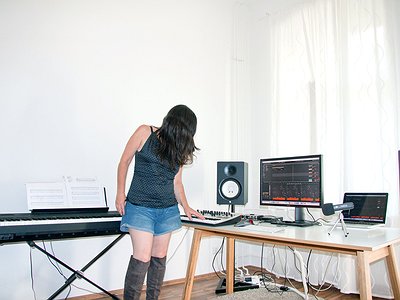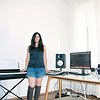Part 2
Could you take us through a day in your life from a possible morning routine through to your work? Do you have a fixed schedule? How do music and other aspects of your life feed back into each other - do you separate them or instead try to make them blend seamlessly?
I'm a freelancer so there is actually no fixed routine. But I have a routine because I have a dog who knows exactly when she deserves her meals or walks and is very punctual about it. I really spend every possible minute on music, whether it's practising a classical piece on the piano or making music, thinking about music or listening to music. But I also discovered it's not really healthy for my body just to sit in front of a computer or a piano all day so I lately added sports to my schedule. Mostly walking a lot around my hood. which was very nice during the Summer and I now joined a fitness studio for the upcoming Winter. A lot of movement is really really important.
Could you describe your creative process on the basis of a piece or album that’s particularly dear to you, please? Where did the ideas come from, how were they transformed in your mind, what did you start with and how do you refine these beginnings into the finished work of art?
To be honest, I usually don’t remember the creative process that much in details. I'm mostly in “the Zone” having fun letting my mind being free. What comes out comes out, mostly in a very intuitive way. I just listen to the sound, piano or synth sound and do my thing. But on my new album “Home” there is one piece “18:00, From my Balcony”, in which I challenged my usual way of making music and wrote the music not directly on the piano or synth keys but by setting the notes first in a notation program. It took me longer than usual to learn to play my own notes on the piano as if they'd been written by another composer and not me. It wasn’t at all familiar to my fingers and that was an interesting process for me.
There are many descriptions of the ideal state of mind for being creative. what is it like for you? What supports this ideal state of mind and what are distractions? Are there strategies to enter into this state more easily?
When I was studying art I was sure I could only create when I felt the muse, and I was waiting for this muse to come. After a while I realised the muse wouldn't come so easily or when I wanted it to be there unless I create the right state of mind or conditions first. And by that I mean: treat it as if it's work and actually make it practical and not just magical and abstract. So I sit in front of the keyboard even if I have no idea in mind what to play, or I'm not in the right mood to play. I force the muse. Sometimes nothing that I find interesting comes out - but sometimes it just flows and then I'm getting into the “zone” and feel the muse which I ordered by initiating the creative process first.
How is playing live and writing music in the studio connected? What do you achieve and draw from each experience personally? How do you see the relationship between improvisation and composition in this regard?
The last time I played live was when I was 13. I played in a concert and made as mentioned already a mistake which made me quit playing the piano until 4 years ago when I discovered my love for the piano again. So playing live in front of an audience is kind of traumatic for me. I don’t feel comfortable being on stage, and I remember that as a child I never enjoyed performing that much. I much more prefer being behind the scenes, playing for myself, writing and composing the music rather than performing live, because then I freeze and become very nervous. I'm so afraid to make a mistake which doesn’t make that much sense, especially because I'm not performing classical music anymore. It is just a really severe irrational fear that I can’t seem to get rid of. Even when I start recording my pieces, I begin to freeze because I'm recording. I really want to get rid of this fear and I know that the only way of getting rid of it would be by performing and having a good experience but I seem to constantly postpone this. And because I don’t perform I don’t write music which is easy to perform live. Sometimes it's even impossible to perform it, so if I do want to perform it, I would have to create a performance version for most of my pieces.
How do you see the relationship between the sound aspects of music and the composition aspects? How do you work with sound and timbre to meet certain production ideas and in which way can certain sounds already take on compositional qualities?
For me, as mentioned already, sound is the most important inspiration for the composition. Every sound inspires me to write a different story, every sound has it own voice and own potential. Picking the right sound comes first, then comes the composition to celebrate the sound. I'm the type of person who will do the mix while writing the piece not afterwards, when it's ‘finished’. It's really all integrated in my mind to serve the piece and what I want to express.
Our sense of hearing shares intriguing connections to other senses. From your experience, what are some of the most inspiring overlaps between different senses and what do they tell us about the way our senses work? What happens to sound at its outermost borders?
Of course our senses overlap. It's all coming from the same ‘source’ and works together symbiotically. Though hearing is my most powerful sense and has a very dominant role in my life. Seeing - well our eyes see first before we understand or react. Touch is important to me while playing the piano, so hearing and expressing my emotions by touch is the most important combination for me. As a photographer, vision inspires me and usually puts me in the right mood to write music. The cover of my new album expresses exactly this notion. It is possible to see a photo I took in Iceland positioned on the piano shelf, where the notes should be. And that's exactly the ambiance I need to write music: Looking at this photo while composing my ideas and emotions by hearing the music and touching the keys.
Art can be a purpose in its own right, but it can also directly feed back into everyday life, take a social and political role and lead to more engagements. Can you describe your approach to art and being an artist?
Being an artist and doing art is more than a title and an occupation for me, it's a motto, it's a lifestyle, a way of living and a way of thinking. I gave up on so much not to compromise, to keep on doing what I love and to be able to afford doing it. I pay the price on a daily basis, but it really is worth the trouble. My art and art exhibitions always deal with personal biographical issues but also always have to do with social political themes as well, ideas such as uprootedness and identity search which could refer to almost everyone these days. My new album is just a continuation of my personal story. I was searching for a place I could call home for so long but searched for a physical place. Eventually I found my home in music - an abstract which has no boundaries and can not be seen, only felt as home. I think this is a positive message for those who are in the same position as me. Searching for their place and peace of mind in this world.
It is remarkable in a way that we have arrived in the 21st. century with the basic concept of music still intact. Do you have a vision of music an idea of what music could be beyond it's current form?
If it's still intact that means that something is working and there is much more to explore. I think nowadays the development is more sound biased because now we have more gear options for exploring it. I mean sound is changing and gaining much more weight and importance. I wouldn’t change a winning horse, though. We all know how humans can demolish and destroy lovely things, so why touch music, the most powerful communicative form that could bring us all together? Hopefully for me, this concept will stay intact.






